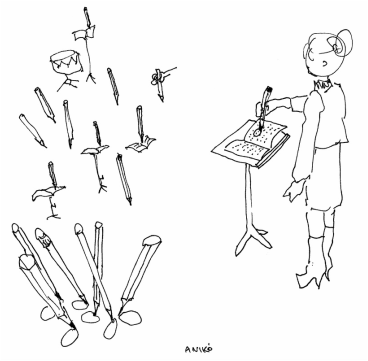Enforce
- I remember at UNL Spring Strings you told us that anything the conductor says should be on our music. What a great reminder. We need it more often! We can't remember everything, however writing in our music will help us come close!
- In a student orchestra, students need to learn to make a mistake only once. Next time, make new mistakes, but don't make the same mistakes over and over again or you will do the same things the rest of your life!
- Repetition is key to making us mark our music. When we hear things more than once it clicks and makes it more important. Still, sometimes the conductor just needs to say "make sure you mark that" and watch us, giving us time to mark it.
- Don't be satisfied when someone doesn't have a pencil. I had a conductor once, (in a youth orchestra) who made pencil-less students take off one of their shoes and exchange it for a pencil with another student. Kind of weird, but it is unforgettable.
- I think if a student understands that there is pressure to not make mistakes over and over again, students will mark their music.
- I think that section leaders are a great deal of help here. If the conductor says to mark something it doesn't always get done. However, if a section leader says to mark something, it usually gets marked.
- Point it out! Say something like "I don't see everyone writing that down!" or perhaps ask everyone to show off their pencil at the beginning of rehearsal. Look at certain people, "did you write that down Jamuna?" This makes the expectation of writing everything into the music known and the players will oblige.
- Specifically say "mark it"
- I also find that when conductors pointedly wait after making a noteworthy comment, the awkward silence forces people to mark their music without the conductor nagging.
- I am aware of how much this is not a forced habit for many. You must train us to do this so that it becomes a habit. Every time the conductor gives an instruction or suggestion we need to be trained to write it down in some way. Once it is engrained, it will stick.
- At first, constantly ask if things have been marked. After a while, it becomes second nature.

Prioritize Marking
- Treat it like it's very important, even important enough to stop playing in the middle of a piece to mark.
- For young students, stress the importance of writing in music. Just having a pencil on the stand will do the job. Kids that are truly passionate about music will make the markings when prompted at a young age, and continue throughout their career.
Pencil
Teach How
- Stress that a pencil is as important as our instrument
- First, make sure everyone knows that having a pencil is non-negotiable.
Teach How
- It's often hard to know what to mark because we haven't received relevant instruction as to how our part fits in the whole. It's difficult to practice at home without all the other parts and then show up and put everything together.
- Just say it and be specific! But don't let it become "habitual circling" - when everything is circled in the same way, it doesn't mean anything! Teach us to make INTENTIONAL markings!
- Show us how make sure we know where.
- Get the students to be creative with how they mark the music. Doodle, draw pictures, write words, or just big bulky shapes they associate with what they need to do at different phrases or notes in the music.
- Make the exact notes you want your students to write down in your own score.
Young Musicians!
please share your own knowledge and advice here
please share your own knowledge and advice here


